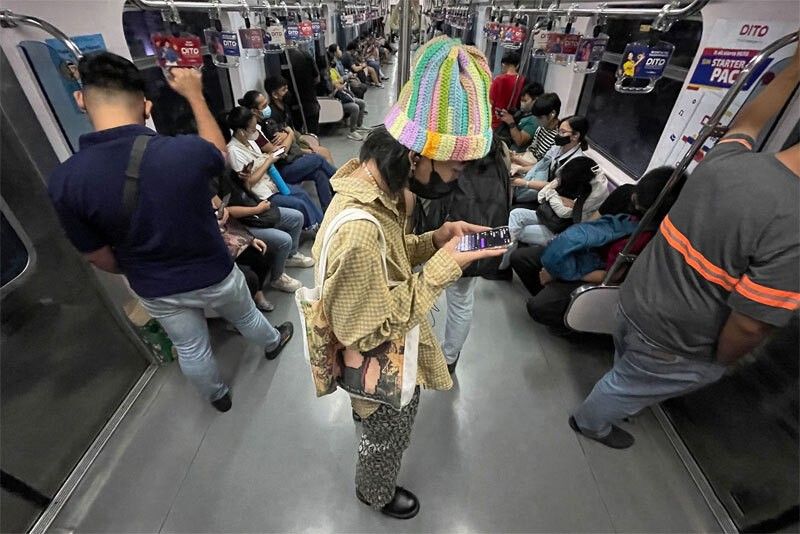
MANILA — The public is advised to wear face masks in trains and railway facilities at all times as the Department of Transportation (DOTr) has reimposed the safety protocol amid the rise in COVID-19 cases nationwide.
DOTr Assistant Secretary for rails Jorjette Aquino said passengers are required to wear face masks inside trains of the Metro Rail Transit Line 3 (MRT-3), Light Rail Transit Lines 1 and 2 (LRT-1 and LRT-2) and the Philippine National Railways (PNR).
In her statement over the weekend, Aquino cited how “medical professionals in the railways sector stressed that the risk of COVID-19 transmission remains present in our trains as they are enclosed spaces.”
Masking will also be required inside stations of the MRT-3, LRT-1 and LRT-2. It will be optional at the PNR stations since these are open areas, Aquino said.
Security personnel of the train lines should ensure that the masking policy will be “strictly enforced,” she said.
The DOTr has reimposed the safety protocol even as the national government policy already allows the optional use of face masks whether indoors or outdoors.
Since COVID-19 is an ongoing threat to public health, authorities still prescribe the wearing of face masks in certain settings like health facilities and public transportation.
The wearing of face masks is part of the DOTr’s “seven commandments” against COVID-19 transmission, which also include the following: refrain from talking or receiving phone calls, as well as eating and drinking, while inside train sets; ventilation and regular disinfection inside the trains must also be ensured at all times; passengers showing COVID-19 symptoms like high body temperature would be banned from entering the stations; and practice physical distancing wherever applicable.
The rail managements have advised commuters to properly wear face masks while inside trains, covering the area of the nose, mouth and chin.
Aquino pointed out that the riding public should “remain vigilant” by wearing face mask even if a majority of Filipinos have already received their doses of COVID-19 vaccines.
“Even if you are fully vaccinated against COVID-19, you can still become infected and potentially spread the virus to others,” she said.
She also called on commuters to get jabbed with the second booster dose of COVID-19 vaccines now that the Department of Health (DOH) has made it available to all adults aged 18 and above.
Last Tuesday, Health Undersecretary and officer-in-charge Maria Rosario Vergeire said they did not see the need to revive the mandatory face masking policy despite the recent increase in COVID-19 cases in the country.
“In terms of returning the mask mandate, no such discussions are ongoing. The DOH believes that the current voluntary masking policy can be maintained as long as the people know when they should wear their masks,” Vergeire said at a press conference.
The DOH has yet to give an update on the COVID-19 situation, but Vergeire said the rising number of infections is not comparable to that of previous years.
“We are not denying that cases are going up. Our cases are up from 274 cases per day last week, to 371 cases per day now,” she said. “Cases are climbing but not as big as the numbers we had in the past years. Cases are expected to increase and decrease depending on the activities in the country.” she said.
